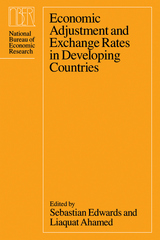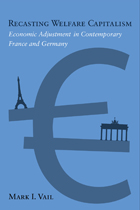3 books about Economic Adjustment

Economic Adjustment and Exchange Rates in Developing Countries
Edited by Sebastian Edwards and Liaquat Ahamed
University of Chicago Press, 1986
In spite of the attention paid exchange rates in recent economic debates on developing countries, relatively few studies have systematically analyzed in detail the various ramifications of exchange rate policy in these countries. In this new volume from the National Bureau of Economic Research, leading economists use rigorous models to tackle various exchange rate issues, while also illuminating policy implications that emerge from their analyses.
The volume, divided into four main sections, addresses: the role of exchange rates in stabilization programs and the adjustment process; the importance of exchange rate policy during liberalization reform in developing countries; exchange rate problems relevant and unique to developing countries, illustrated by case studies; and the problems defining, measuring, and identifying determinants of real exchange rates. Authors of individual papers examine the relation between commercial policies and exchange rates, the role of exchange rate policy in stabilization programs, the effectiveness of devaluations as a policy tool, and the interaction between exchange rate terms of trade an capital flow. This research will not only prove crucial to our understanding of the role of exchange rates in developing countries, but will clearly set the standard for future work in the field.
The volume, divided into four main sections, addresses: the role of exchange rates in stabilization programs and the adjustment process; the importance of exchange rate policy during liberalization reform in developing countries; exchange rate problems relevant and unique to developing countries, illustrated by case studies; and the problems defining, measuring, and identifying determinants of real exchange rates. Authors of individual papers examine the relation between commercial policies and exchange rates, the role of exchange rate policy in stabilization programs, the effectiveness of devaluations as a policy tool, and the interaction between exchange rate terms of trade an capital flow. This research will not only prove crucial to our understanding of the role of exchange rates in developing countries, but will clearly set the standard for future work in the field.
[more]

Economic Adjustment and Reform in Eastern Europe and the Soviet Union
Essays in Honor of Franklyn D. Holzman
Josef C. Brada, Ed A. Hewett, and Thomas Wolf, eds.
Duke University Press, 1988
Economic reform, structural adjustment, macroeconomic stabilization, and participation in the world economy are interconnected aspects of the same issue: the long-term economic viability of centrally planned economies in the rapidly changing economic environment of the modern world. Any economic strategy that focuses on only one or two of these aspects at the expense of the others is likely to fail; yet even strategies that build on all of these bases may well fail unless political leaders can muster exceptional skill, garner international support, and enjoy some good luck.
The contributions to this volume reflect the recent research on this issue by various specialists on the economies of the Soviet Union and Eastern Europe. Each author emphasizes macroeconomic stabilization, structural adjustment, participation in the larger world economy, or ecomonic reform.
[more]

Recasting Welfare Capitalism
Economic Adjustment in Contemporary France and Germany
Mark I. Vail
Temple University Press, 2009
In Recasting Welfare Capitalism, Mark Vail employs a sophisticated and original theoretical approach to compare welfare states and political-economic adjustment in Germany and France. He examines how and why institutional change takes place and what factors characterize economic evolution when moving from times of prosperity to more austere periods and back again. Covering the 1970s to the present, Vail analyzes social and economic reforms, including labor policy, social-insurance, and anti-poverty programs. He focuses on the tactics and actions of key political players, and demolishes the stagnation argument that suggests that France and Germany have largely frozen political economies, incapable of reform.
Vail finds that these respective evolutions involve interrelated changes in social and economic policies and are characterized by political relationships that are continuously renegotiated—often in unpredictable ways. In the process, he presents a compelling reconceptualization of change in both the welfare state and the broader political economy during an age of globalization.
Vail finds that these respective evolutions involve interrelated changes in social and economic policies and are characterized by political relationships that are continuously renegotiated—often in unpredictable ways. In the process, he presents a compelling reconceptualization of change in both the welfare state and the broader political economy during an age of globalization.
[more]
READERS
Browse our collection.
PUBLISHERS
See BiblioVault's publisher services.
STUDENT SERVICES
Files for college accessibility offices.
UChicago Accessibility Resources
home | accessibility | search | about | contact us
BiblioVault ® 2001 - 2024
The University of Chicago Press









